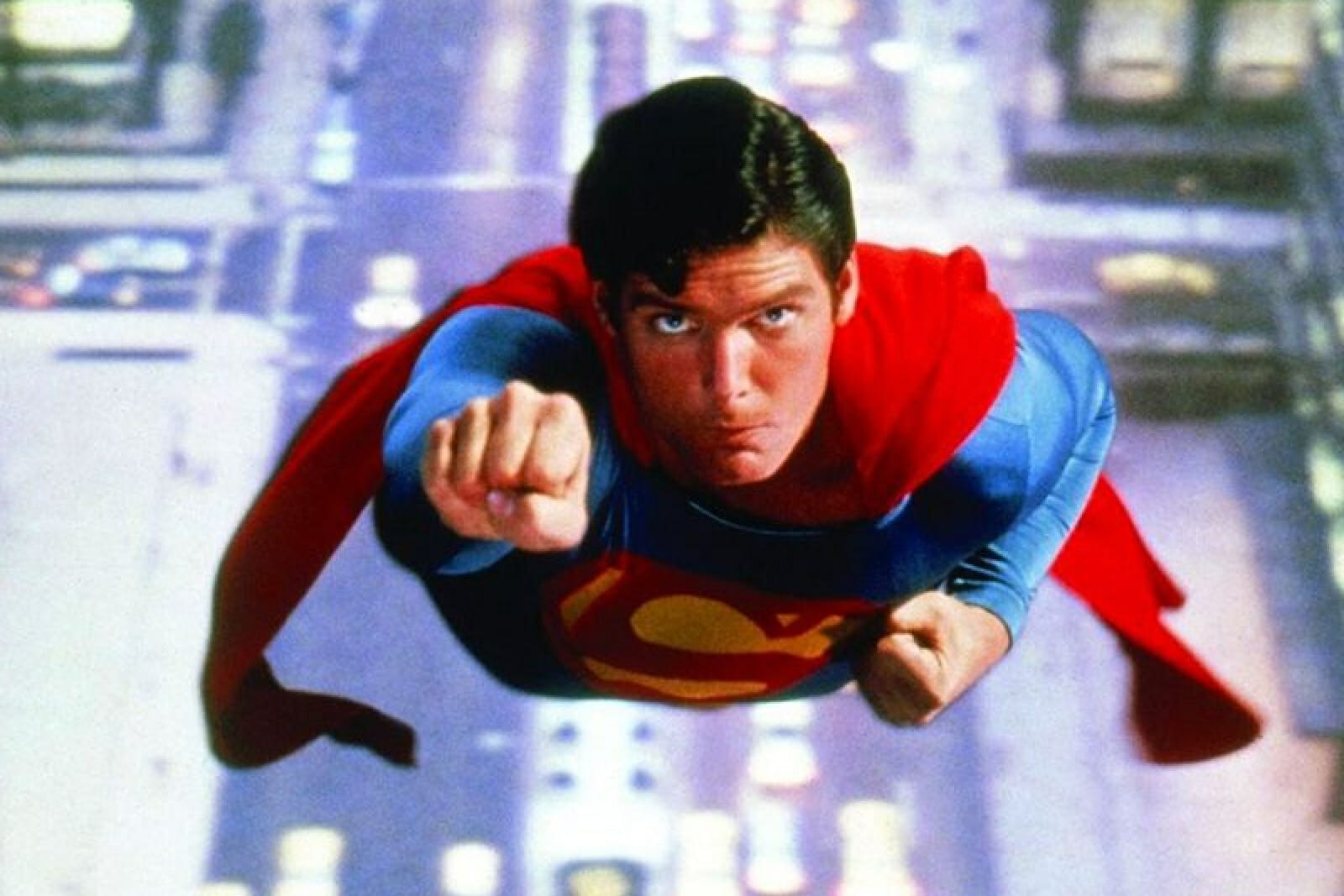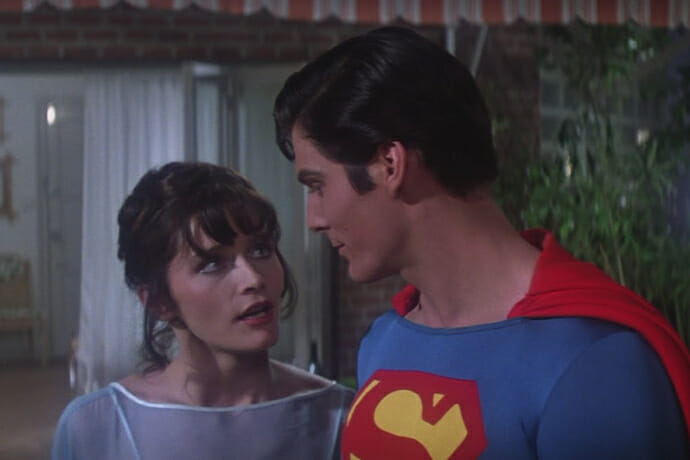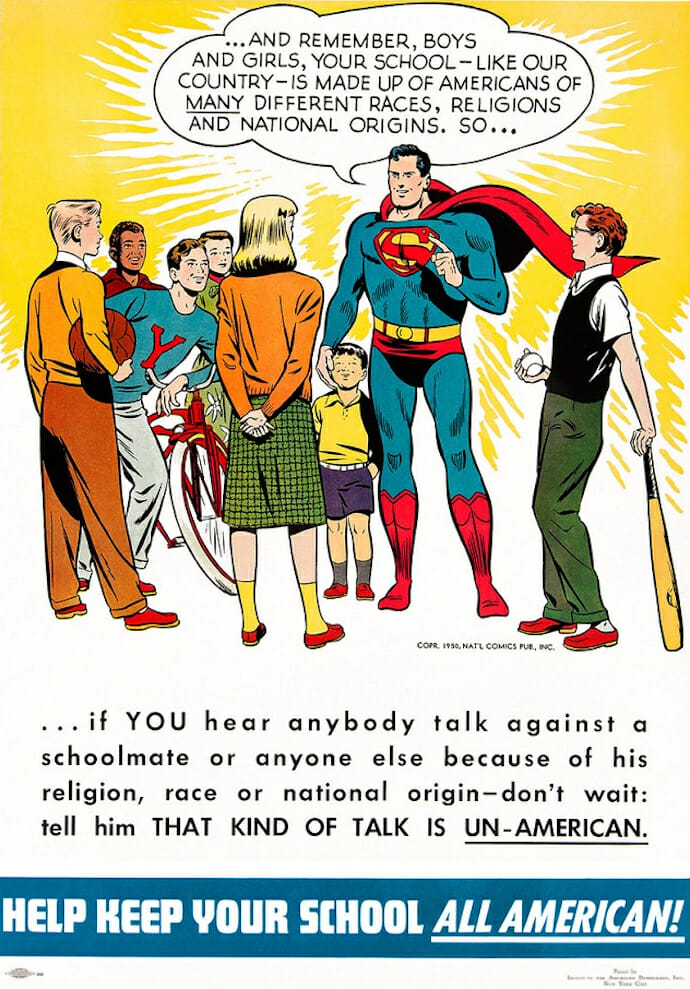
Thinking of America through Superman and ‘Ghostbusters II’ following a Biden Victory
When Joe Biden took the stage in Wilmington, Delaware to accept victory in being elected the 46th U.S. president in one of the most important elections in a generation, he concluded by waving to the crowd to the sounds of Jackie Wilson’s “(Your Love Keeps Lifting Me) Higher and Higher”. And while I’m sure President-elect Biden had no way of knowing this, playing the song invoked a movie moment that seemed to sum up the entire Biden-Harris victory.
One of my all-time favorite movies, hell, one of my all-time favorite franchises is Ghostbusters. Ghostbusters was the first movie my parents saw together as a married couple, and that motivated them to show the movie to me when I was still probably too young to get all the jokes. Nevertheless, it’s easily one of my favorite movies ever, as well as probably the movie that I quote the most often. Favorites include “I have some news from the world of Gozer,” “We came, we saw, we kicked its ass,” and “If there’s a steady paycheck in it, I’ll believe anything you say.” I’ve watched both the Real Ghostbusters and Extreme Ghostbusters cartoons, played the awesome video game, and watched the 2016 reboot. But my focus here is actually on the only sequel to the original film, 1989’s Ghostbusters II. While I admit to this not being nearly as good as the first, I also think it’s unfairly maligned, because it features an arguably better villain in Vigo the Carpathian (“He is Vigo! You are like the buzzing of flies to him!”), as well as some great jokes and moments.
One of those great moments is when the Ghostbusters, defeated, wonder what they can do to help inspire the people of New York, whose positive energy could allow them to effectively fight Vigo. “You know, I just can’t believe things have gotten so bad in this city that there’s no way back,” Ray Stantz (Dan Aykroyd) says. “But come on! There’s got to be a few sparks of sweet humanity left in this burned-out ‘burg and we just have to figure out a way to mobilize it.”
“He’s right, we need something that everyone in this town can get behind,” Egon Spengler (the late, great Harold Ramis) reiterates. “We need…a symbol,” he says, eyeing a New York license plate of a cab in front of them. It then dawns on each of the Ghostbusters: “Something that appeals to the best in each and every one of us.” “Something good.” “Something decent.” “Something pure.” It becomes apparent that they mean the Statue of Liberty. They decide to douse Lady Liberty in a psycho-reactive slime they discovered earlier in the movie. Once activated, Lady Liberty comes to life, her torch exploding with real fire. The Ghostbusters watch from her crown as she walks through New York harbor to emerge on dry land. And the song the Ghostbusters are playing is Howard Huntsberry’s cover of “(Your Love Keeps Lifting Me) Higher and Higher,” the same song President-elect Biden ended his speech with.
Just like Americans in cities all across this great nation after Biden’s electoral victory was called by major news outlets, New Yorkers flocked to the street to cheer, celebrate and witness this most American of symbols walking through the city. Just like the world-weary New Yorkers of Ghostbusters II, Americans needed a symbol, and that symbol is the underlying strength of our democracy. This is embodied not just in the choice to change course and rebuke the authoritarian tendencies of the now-one term President Trump, but the promise of the uniquely American melting pot, as demonstrated by the election of California Senator Kamala Harris as vice president-elect, who will become the first woman, Black person, a person of Asian descent, and child of immigrants in the position.
I doubt President-elect Biden chose the song to invoke the climax of Ghostbusters II, a scene that includes cheering Americans reinvigorated by an undeniable symbol of democracy. He probably just really likes the song, which is understandable, he was in his mid-20s when it initially debuted. But for me, the parallels were undeniable: Joe Biden and Kamala Harris won, and it felt like the Statue of Liberty itself was walking the streets of American cities, reinforcing our democratic values, causing people to celebrate and cheer. “What I must admit surprised me tonight were scenes all over this nation, all cities in all parts of the country, indeed, all across the world: an outpouring of joy, of hope, renewed faith in tomorrow to bring a better day,” Biden said during his victory speech. Not to mention, I might’ve associated the villainous Vigo with President Trump, since not only were they both authoritarian madmen, but have similarly-odd hairstyles.
This election result has stirred patriotic pride, not just in myself, but I imagine in many others, as well. Those feelings had to be kept dormant during the grueling four years of the Trump administration. Witnessing a presidential administration wreck so much and cause so much damage to what I had believed were our collective values was incredibly disheartening. But when I personally think of something from the American mythos that I think best personifies the country’s values, it’s not the Statue of Liberty or Uncle Sam. I think of my favorite character in all of fiction, Superman. Superman arrives in America essentially an immigrant, who traveled a vast distance, guided by parents who wanted him to escape hardship and live somewhere where he could maximize his own potential. He works hard to become his adopted homeland’s champion and personification of its inherent righteousness.
Superman was created by the children of two different respective families of Jewish immigrants, Jerry Siegel and Joe Shuster, at the height of Nazi-inspired anti-Semitism in Europe. As Superman grew in importance and popularity, part of his lasting legacy was fighting the racism and bigotry of the Ku Klux Klan on his radio show in the 1940s. In a motivational poster from the 1950s that many, myself included, have shared in the Trump era, Superman talks to a group of assembled youngsters and says “And remember, boys and girls, your school –like our country– is made up of Americans of many different races, religions, and national origins. So, if you hear anybody talk against a schoolmate or anyone else because of his religion, race, or national origin– don’t wait: tell him THAT KIND OF TALK IS UN-AMERICAN.”

I’ve been reflecting a lot on Superman’s catchphrase, “truth, justice, and the American way,” in the days since the election. In the 1978 Superman movie, Lois Lane (Margot Kidder) asks Superman “why are you here? There must be a reason for you to be here.” “Yes,” Superman (Christopher Reeve) responds solemnly. “I’m here to fight for truth and justice and the American way.” Lois scoffs and laughs, responding “You’re going to end up fighting every elected official in this country!” “I’m sure you don’t really mean that, Lois,” Superman says. Lane looks away and says “I don’t believe this.” After a pause, Superman simply says “Lois, I never lie.”
It’s easy to be a cynic like Lois Lane and dismiss the notion outright, that the nation’s politicians can’t possibly live up to the standard of the nation itself. But in an era when truth itself seemed to be the subject of debate, hearing a symbol of America refute the very notion of lying feels reassuring these days. Moreover, the principles of “truth” and “justice” go hand-in-hand with “the American way” provide real power to those words that weren’t there previously. How much better would the world be if the President of the United States, whoever that might be, was as consistently committed to the values of truth, justice, and the American way as Superman is?

Another thought that has been on my mind is the question of how each of us relates to the concept of America as a whole. Is it simply working at a job? Or the act of voting? We are an eclectic nation, with regional differences but a certain level of national hegemony. You see this in sports matches, be they baseball, football, or basketball, as different teams from different parts of the country duke it out for superiority, but abide by an agreement about what the game is and what the rules are. Sports make up a fabric of this unique republic, as do things like cuisine and music. Few other nations could provide food as distinct as Rhode Island calamari, Texas chili, Hawaiian pineapple, and coconut, or the all-American apple pie, and could provide music as different as New Orleans jazz, Nashville country, D.C. punk, and L.A. rap.
I myself find that I relate differently to the country than I used to because of my interest in the National Film Registry, the Library of Congress’ annual selection of American movies to be preserved for all time for their “aesthetic, cultural, or historical significance.” Rather than merely reward what is considered cutting edge or popular, the National Film Registry approach asks different fundamental questions: What films exemplify who we are? Which ones had something to say? Which ones do future generations deserve to witness?
I think of those generations yet to come as something that has motivated Americans throughout history. The Founding Fathers knew what they had fought for, and later created a stable, but inherently flawed government. If you’ve ever seen Hamilton on either the stage or screen (I’m lucky enough to have seen it both ways), you know that some of those very Founding Fathers, including Alexander Hamilton himself, knew that the important work was laying the foundation and precedent for the new nation. Some of the flaws in the American system were fixed during the Civil War as slavery came to an end, and the work continued through the Civil Rights Movement. After World War II, Americans and our allies crafted a peace that they hoped would prevent the sort of catastrophic war seen twice already that century. In today’s world, the work of preventing climate change is foremost in many people’s minds when we think of what needs to be accomplished for the sake of future generations. But this Biden victory feels like a signal that future historians will look back on: at this moment, at this critical juncture, Americans arrived, they voted, and they were heard.
I started this year writing about Star Trek: First Contact, and it too has been on my mind in recent days. The character of Zephram Cochrane (James Cromwell) is the somewhat-brutish elderly man who unpredictably becomes the founding father of the future. Cochrane can also be a little goofy and a little brash, and as anyone who has heard his “Cornpop” story can attest, so can the president-elect. But towards the end of the film, Cochrane has this sort of solemn strength about him that reminds me of President-elect Biden, as he accepts his destiny and moves to be a more conscientious figure and leader.
At the time, I wrote that Star Trek: First Contact had “messages that were pertinent, particularly in an election year: Great people can come from humble, unexpected beginnings. Sometimes, the most transformative people in history are those who initially shun the limelight before accepting their destiny. Definitive moments in our history are not simply just about change, but about transformation. These moments can transcend to become something far beyond their original purpose. The world may seem dark, disjointed, overwhelming, and cheerless, but exciting, revolutionary things can be around the corner.”
Since I wrote those words, a global pandemic has hit and killed hundreds of thousands, everyone’s lives have been upended, and we find ourselves in a world where we can’t hug one another and can’t even see the smile of a stranger through a facemask. Since I wrote those words, Americans everywhere came out in droves to protest police brutality and systemic racism. Now, in this transitionary moment, I hope that people reflect, heal, and refocus on what unites us. There is joy, meaning and patriotism to be found in doing simple acts that are unmistakably, perhaps even uniquely American: voting; eating a slice of apple pie; listening to Dylan, Springsteen, Gaye, Elvis, Aretha, or Jay-Z; catching a baseball game; and yes, even reading a Superman comic or watching Ghostbusters II.

